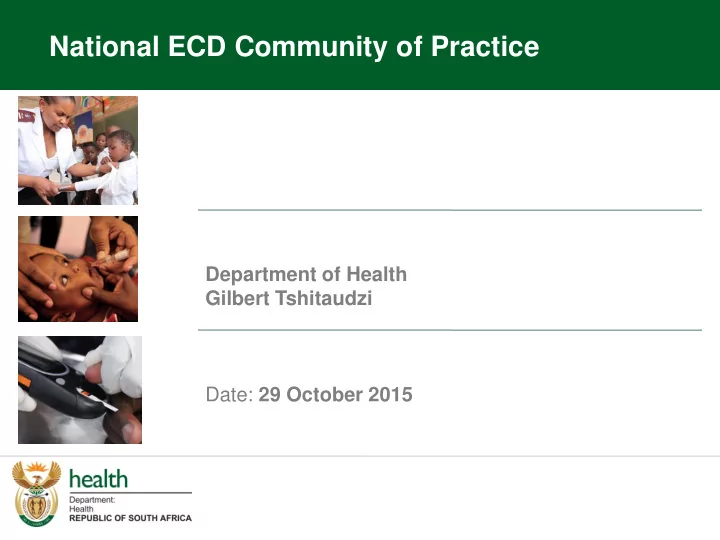

National ECD Community of Practice Department of Health Gilbert Tshitaudzi Date: 29 October 2015
Our Children- Our Future Evaluation of Nutrition Interventions for Under 5s
Background Overview • The DPME commissioned a Diagnostic/ Implementation evaluation of Nutrition Interventions for Children Under 5 • Partners DoH, DSD, DAFF, DRDLR, DPME, UNICEF • Report tabled at the Social Protection, Community and Human Development Cluster and Cabinet
Background Evaluation • Study completed in March 2014 – undertaken independently by Khulisa Management Services • Field work in 4 provinces, KZN, E Cape, W Cape and Free State • Compared South Africa’s response to nutrition with 5 countries which have successfully improved nutrition, including Brazil, Colombia, Mozambique, Malaysia, and Malawi. • Looked at 18 nutrition interventions (5 high impact) with 4 detailed case studies
CAUSES OF CHILDREN UNDER 5 DEATHS IN RSA Meningitis 6% TB 7% ARI 29% 34 % were Septicaemia Malnourished 16% Diarrhoea 21% Saving Children, 2013
Countries with High Burden of Malnutrition (Lancet 2013) Heading
UNDERNUTRITION IN 1-3 YEAR OLDS 30 28 26.5 26 23.4 24 22 20 18 16 14 11 12 9.5 10 8 6.4 6.1 5.1 6 4 2.2 1.7 1.2 1.1 0.9 2 0 Stunting Severe stunting Wasting Severe wasting Underweight Severe underweight NFCS 2005 SANHANES 2012
Prevalence of overweight and obesity of children aged 2-14 years by sex & age, SA 2012 Males (n=2123) Females (n=2155) 25 25 20 20 18.9 17.5 16.7 Percentage Percentage 15 15 12.3 10 10 7.5 5.6 4.1 4.9 5 4.5 4.4 5 2.7 2.7 0 0 2-5 6-9 10-14 2-5 6-9 10-14 SANHANE S
Evaluation Focus The Focus of the Evaluation was on Determining the: • Sufficiency of National and Provincial Policies • Leadership and Resource Allocation • District Management and Oversight; and • Local level services delivery
Key Findings 18 Nutrition Interventions • 9/18 interventions scored positively for implementation effectiveness – mostly clinical interventions from DoH and ECD food support • Remaining 9 interventions scored significantly lower - mainly DoH behaviour change interventions and food access and agricultural interventions • Factors contributing to strong implementation include: nutrition sensitivity, clear targets for pregnant women/children under 5, and standard operating procedures/ guidelines
Implementation Effectiveness Scores Heading Text text text text text text text text text text text text text text text text text text text text text text text text text text Text text text text text text text text text text text text text text text text text text text text text text text text text text Text text text text text text text text text text text text text text text text text text text text text text text text text text Text text text text text text text text text text text text text text text text text text text text text text text text text text
Implementation Effectiveness Scores Heading Text text text text text text text text text text text text text text text text text text text text text text text text text Text text text text text text text text text text text text text text text text text text text text text text text text text text Text text text text text text text text text text text text text text text text text text text text text text text text text text Text text text text text text text text text text text text text text text text text text text text text text text text text text
Key Findings Mainstreaming of Nutrition Interventions • Nutrition better mainstreamed in DoH through its delivery platform of curative health care services • Sub-optimal main streaming of behavioural change related interventions (e.g. Hand washing, breastfeeding, etc.) • DSD’s food access interventions inadequately mainstreamed - lack of guidelines and monitoring to address quality of food provided, and lack of targeting of young children most vulnerable to malnutrition. • In agriculture, no nutrition sensitivity in programme design
Key Findings Policy Gaps and Leadership • No policies govern the inappropriate marketing of unhealthy (obesogenic) food to children – Draft Regulations in place • Linkages of nutrition targets with various govt. depts. APP - more obvious for DoH than other depts • Leadership and Coordination mechanisms for nutrition is more visible for DoH at all levels than for other departments.
Key Findings Continued…… • All departments have staff shortages and lack nutrition- trained personnel. Community workers can contribute (as in KZN/EC) but support, oversight and monitoring by nutrition-trained supervisors is crucial. • Nutrition knowledge among nutrition staff e.g. nurses is inadequate except for nurses in KZN • There are stockouts of key commodities, a shortage of information, education and communication materials
Recommendations • Develop integrated nutrition plan/framework for interventions for children under 5 • Establish supra departmental structure for coordination of nutrition (National Health Commission/Food & Nutrition Security Advisory Committee, ECD Agency?) • Posts at a higher level to champion nutrition • Use community-based nutrition workers /NGOs using Community Works Programme/EPWP to support implementation (e.g. KZN model)
Recommendations • Strengthen focus on behaviour change and include training on nutrition for local services • Establish national norms for nutrition supplies • DAFF to look at integrated household food production programme using community-based workers and NGOs • DSD’s Community Nutrition and Development (CNDC) centres should be expanded to cover children under 5 discharged from hospitals
Recommendations • Community level services provided at community and facility level in a PHC context • promote use of healthy and diverse foods – guidelines to be developed by DOH for various government departments providing food e.g. Soup kitchens, voucher system, home gardening, etc. • Improve focus on food security – specific reference to children - explore roles that NGO’s supporting food gardens can play, - Food parcel composition and production of indigenous nutrient rich foods
Multi-Sectoral Nature of Nutrition
Thank You
Recommend
More recommend